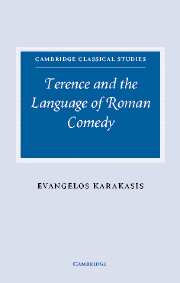Book contents
- Frontmatter
- Contents
- Acknowledgements
- Conspectus siglorum
- Introduction
- Part I Linguistic differentiation in Terence
- 1 Colloquialisms
- 2 Archaisms
- 3 Senilis μακρολογία and περισσολογία
- 4 Hellenisms
- 5 Features of elevated language
- 6 Idiolect
- 7 Plautus in Terence: the case of Eunuchus
- Part II Linguistic and stylistic unity in Roman comedy
- Bibliography
- Index locorum
- Index nominum et rerum
1 - Colloquialisms
Published online by Cambridge University Press: 22 September 2009
- Frontmatter
- Contents
- Acknowledgements
- Conspectus siglorum
- Introduction
- Part I Linguistic differentiation in Terence
- 1 Colloquialisms
- 2 Archaisms
- 3 Senilis μακρολογία and περισσολογία
- 4 Hellenisms
- 5 Features of elevated language
- 6 Idiolect
- 7 Plautus in Terence: the case of Eunuchus
- Part II Linguistic and stylistic unity in Roman comedy
- Bibliography
- Index locorum
- Index nominum et rerum
Summary
Introduction
Donatus
Since the beginnings of linguistic research on Terence, colloquialisms have formed the centre of interest. Thus, the comments of ancient grammarians contain prescriptive observations on the popular or even faulty nature of certain features. Donatus remarks upon Terence's use of language to differentiate the speech of his low characters, mainly slaves. According to the grammarian, Terence has his low characters use several linguistic or stylistic irregularities that are considered appropriate to the speech of persons of a low social rank. Commenting on Parmeno's quia enim qui eos gubernat animus eum infirmum gerunt at Hec. 311, Donatus remarks that this ἀνακόλουθον is appropriate for a servant. Similarly at Phorm. 186 Geta says: loquarne? incendam; taceam? instigem; purgem me? laterem lavem. Donatus remarks on the asyndetic series of questions – answers in place of conditional clauses: haec et perturbatae et servilis imperitaeque personae verba sine arte esse. Censuring the reiteration of the verb nescio in the speech of the slave Parmeno at Hec. 323ff., he observes: perturbatus Parmeno idem repetit verbum. et aptum est personae servili.
Not only slaves but other low and rustic characters are characterised by faulty diction. This is especially the case with the language of the soldier Thraso in the Eunuchus. Donatus points out an ἀνακόλουθον et vitiosa responsio, namely vobis fretus (v. 1063), and he adds that nisi enim addideris ‘sum’ erit soloecismus conveniens loquenti, impolito homini et militi. When Thraso says risu omnes qui aderant emoriri (v. 432), Donatus remarks that among the comic playwrights it is customary to attribute defective words to ridiculous and ignorant characters.
- Type
- Chapter
- Information
- Terence and the Language of Roman Comedy , pp. 21 - 43Publisher: Cambridge University PressPrint publication year: 2005

